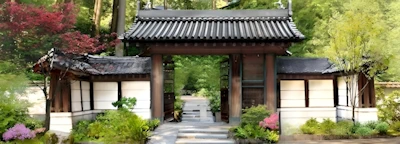Hammond Museum and Japanese Stroll Garden
Event Location
North Salem, NY 10560
A Stroll Garden does not reveal itself all at once. Rather, paths are meant to lead from a view of the pond to a view of a distant landscape. The design of a path directs one's progression through the garden: large stepping stones slow the walk, encouraging contemplation of the view, while row after row of smaller, more uniform stones create a feeling of excitement or anticipation for an approaching feature. The 'journey' through a Stroll Garden is meant to be a highly orchestrated voyage to a deeper understanding of nature.
Westerners are accustomed to the concept that the Garden as a whole is a metaphor - the garden as Eden, for example. Even Voltaire exhorted his 18th-century audience, 'Cultivate your own garden!' he was obviously not referring to a vegetable patch or perennial border, he was referring to gardens metaphorically. Japanese gardening techniques take this idea much further. Not only is the garden as a whole a microcosm of the world but each path, indeed each rock that makes up the path, is a metaphor for something else.
The concept that individual components of the garden symbolize different ideas is strictly an Eastern notion. In Japan, the iconography is so well known that modern designers will often 'quote' famous gardens of the past knowing that visitors will understand the reference.
Although the various garden types, the Hill and Pond, Dry Landscape, Stroll, Tea and Courtyard gardens, often overlap, within them certain restrictions apply. A Japanese landscape designer uses these types, as well as other devices such as composition and texture much as an artist uses different mediums and imagery to convey his message.
Far from being rigid and abstract, a successful Japanese garden is a sensual experience. It incorporates sound - the crunching of pebbles underfoot, the wind through the bamboo: sight - the beauty of the arrangement of the garden as a whole; touch - the singular sensation of pine branches brushing against your arm; and smell - the gentle aroma of the katsura trees in early autumn.
The Japanese garden invites contemplation: every design element is carefully planned to give structure to an idea. The rocks, sand, water and plants create a microcosmic universe in which the whole is more than the sum of its parts.
Garden Views
In a Japanese garden, nothing is natural or left to chance. Each plant is chosen according to aesthetic principles, either to hide undesirable sights, to serve as a backdrop to certain garden features, or to create a picturesque scene, like a landscape painting or postcard. It's been the beautiful backdrop for many memorable weddings and photographic events.
Contact
Phone: (914) 669-5033Location Website
Click to Visit
(For Event Information See Event Website Page)
Authentic Japanese Gardens (United States)
Best Japanese Gardens
Japanese Rock 'Zen' Gardens (United States)
Best Japanese Rock 'Zen' Gardens
Japanese Teahouses (United States)
Best Japanese Teahouses
Japanese Museum Art
Japanese Museums Map of Japanese Museums

















